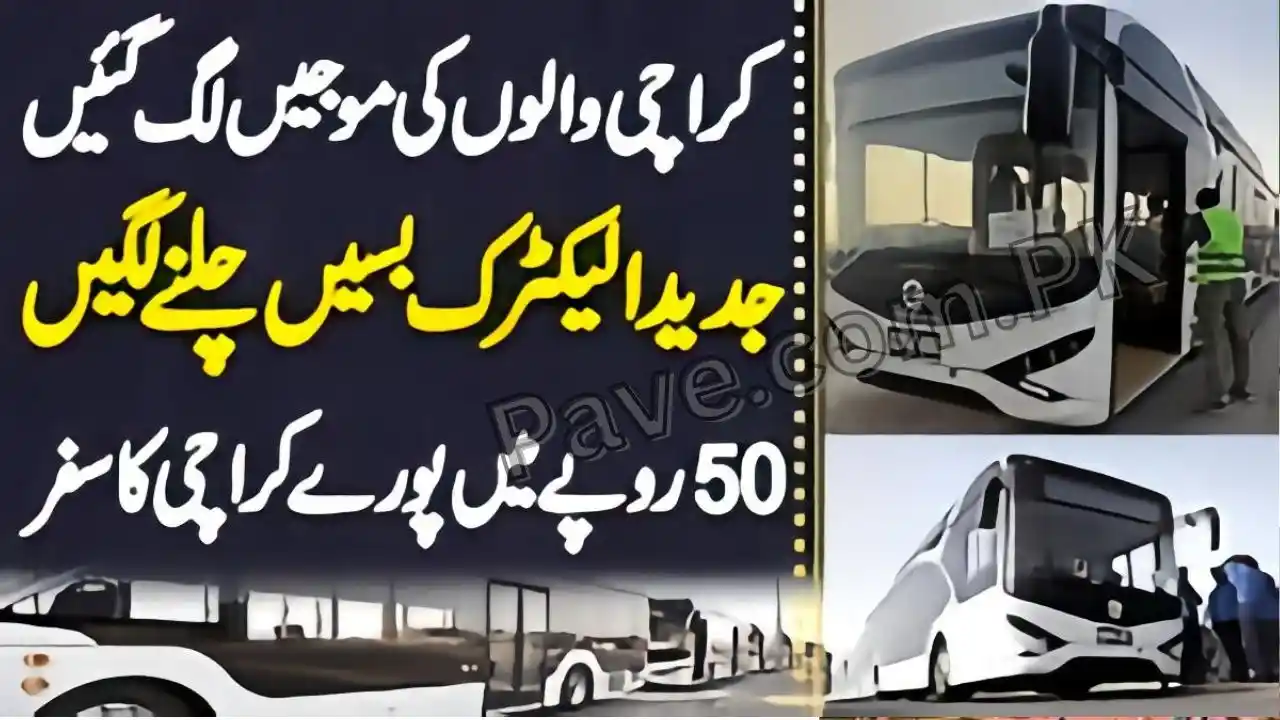500 Electric Buses to Be Introduced in Karachi and Hyderabad – Sindh updates

In a landmark move toward sustainable transportation, the Sindh Government has approved the deployment of 500 fully electric buses across Karachi and Hyderabad, marking one of Pakistan’s most ambitious clean mobility initiatives to date. The project, launched under the province’s Public Transport Modernization and Climate Action Program, aims to replace outdated, smoke-emitting vehicles with zero-emission, technology-enabled buses designed for urban convenience and environmental preservation.500 Electric Buses to Be Introduced in Karachi and Hyderabad
At a time when petrol prices continue to fluctuate, air quality levels are rapidly deteriorating, and citizens face daily commuting discomfort, this electric fleet signals the beginning of a new public transport era — one that prioritizes efficiency, comfort, affordability, and sustainability.
A New Vision for Public Transport — Smart, Electric, and Inclusive
Unlike previous bus initiatives that relied on fossil fuels, the newly introduced electric fleet will operate on battery-powered motors, consume no diesel, and generate zero tailpipe emissions. Each bus is expected to be equipped with:
- Air-Conditioned Interiors for passenger comfort
- Low-Floor Accessibility for senior citizens and differently-abled commuters
- CCTV Surveillance & Live Tracking for enhanced safety
- Smart Ticketing System with QR & Card Payments
- Reserved Compartments for Women and Families
With these features, the Sindh Government is positioning electric buses not just as transport vehicles, but as an urban mobility experience.
Read Also: Pakistan’s Biggest Wastewater Treatment Plant Announced for Lahore
Phased Deployment & Priority Routes
The rollout will occur in progressive phases. In Karachi, key priority routes include:
- Nagan Chowrangi → Saddar → Tower
- Gulshan-e-Iqbal → Tariq Road → Clifton / DHA
- Surjani Town → SITE → Keamari Port
- Malir → Korangi Industrial Area
For Hyderabad, initial operations will commence on:
- Hyderabad Bypass → Qasimabad → Latifabad
- Auto Bhan Road → City Inner Belt
Charging depots will be installed at strategic bus terminals, powered through hybrid energy sources combining grid electricity and solar solutions to maintain efficiency even during load-shedding.
Economic & Environmental Impact at Scale
The introduction of 500 electric buses is expected to produce three major socio-economic benefits:
| Impact Type | Expected Outcome |
|---|---|
| Environmental | Reduction of up to 30,000 tons of CO₂ emissions annually |
| Economic | Savings on foreign exchange previously spent on fuel imports |
| Social | Affordable and dignified transport for students, women, laborers, and professionals |
By offering cheaper ticket pricing compared to traditional hiace vans, the government hopes to shift public preference from private motorcycles and rickshaws to mass transit — significantly reducing traffic congestion in Karachi’s overburdened road network.
Public-Private Partnership Model — A Scalable Approach
Rather than relying entirely on government expenditure, the project follows a Public-Private Partnership (PPP) model, where private operators will handle fleet management while the government provides subsidies, regulatory support, and infrastructure.
This hybrid model allows:
- Rapid scalability across other cities like Sukkur, Larkana, and Nawabshah
- Enhanced maintenance support through trained EV technicians
- Reduced pressure on provincial budgets
Challenges & Mitigation Plans
While the announcement is promising, successful execution will depend on overcoming key challenges:
| Challenge | Mitigation Strategy |
|---|---|
| Unstable electricity supply | On-site solar backup at charging stations |
| Lack of EV-trained technical staff | Skill development partnerships with technical institutes |
| Public acceptance of new transport system | Aggressive awareness campaigns & promotional ticket fares |
The government has also hinted at local assembly of electric buses in the future, which could boost the national EV manufacturing ecosystem.
Final Outlook — A Transformative Beginning for Urban Pakistan
The introduction of 500 electric buses in Karachi and Hyderabad is not merely a transit upgrade — it is a statement of progress, a declaration that Pakistan’s cities can evolve beyond chaos and pollution toward structured, clean, and futuristic mobility.
If implemented with consistency and public engagement, this initiative could redefine how citizens move, breathe, and live in urban Pakistan — potentially inspiring other provinces to replicate the same blueprint.
The Sindh government has officially approved the launch of 500 electric buses in Karachi, aiming to revolutionize the city’s public transport system. With rising fuel costs, worsening air quality, and overcrowded vehicles, this initiative comes as a much-needed relief for daily commuters. The move marks a significant shift from outdated, smoke-emitting buses toward modern, eco-friendly mobility solutions.
Read Also: Punjab Asaan Karobar Card Scheme Phase 2 Launches for SMEs in New Cities 2025
Why Karachi Needs Electric Buses
Karachi, Pakistan’s largest city, faces heavy traffic congestion and high pollution levels caused by fossil-fuel vehicles. Most public buses lack air conditioning, proper seating, and safety features. Commuters often travel in overloaded, poorly maintained buses, leading to discomfort and safety risks.
The introduction of electric buses aims to address multiple long-standing issues:
- Zero emissions for cleaner air
- Affordable ticket prices for daily travelers
- Comfortable and safe travel experience
- Reduced dependency on petrol and diesel
Key Features of the Electric Bus Service
The upcoming electric fleet is designed to meet international public transport standards. Each bus is expected to include:
| Feature | Benefit |
|---|---|
| Air-Conditioned Interiors | Comfortable travel in summer heat |
| Low-Floor Design | Easy access for women, seniors, and disabled persons |
| Smart Ticketing System | QR-based digital payments |
| GPS Tracking & Security Cameras | Safer commute with live monitoring |
| Reserved Seats for Women and Families | Inclusive and respectful environment |
The Sindh government has ensured that ticket prices will remain lower than private vans and hiace vehicles, making it budget-friendly for working-class commuters.
Planned Routes for Electric Buses in Karachi
Although final routes are yet to be officially announced, the transport department has identified high-demand corridors where electric buses are expected to operate first:
- Saddar to Korangi
- Nagan Chowrangi to Tower
- Gulshan-e-Iqbal to Clifton
- Surjani Town to SITE Industrial Area
- Malir to Shahrah-e-Faisal
These areas cover key office hubs, industrial zones, and residential districts, ensuring maximum utilization of the fleet.
Environmental and Economic Benefits
The electric buses will run on rechargeable battery packs, eliminating harmful emissions. This will help:
- Reduce smog and pollution
- Lower health risks caused by toxic vehicle smoke
- Cut fuel import dependency
Moreover, electric buses have lower operating costs than diesel buses. This makes the project financially sustainable for long-term operations.
Read Also: CM Punjab Launches Livestock Card Phase 2 – Empowering Rural Women
Government’s Long-Term Plan
The Sindh government plans to expand the electric fleet gradually if the first 500 buses perform successfully. Authorities are also considering setting up local EV assembly partnerships to manufacture buses within Pakistan, which will:
- Create new jobs
- Reduce import costs
- Strengthen the national EV industry
The success of this project in Karachi may encourage other provinces like Punjab and Khyber Pakhtunkhwa to adopt similar eco-friendly transport solutions.
A Step Toward a Cleaner and Smarter Karachi
The launch of 500 electric buses in Karachi represents more than just a transport reform — it is a declaration of change. For the first time, citizens will get access to clean, comfortable, and affordable commuting options similar to global cities.
500 Electric Buses to Be Introduced in Karachi and Hyderabad Conclusion
The introduction of 500 electric buses in Karachi is more than a transport upgrade—it is a transformative step toward a cleaner, smarter, and more organized city. With zero emissions, affordable fares, and modern passenger-friendly features, these buses promise to replace the long-standing culture of overcrowded and polluting public transport. If executed with consistency and proper maintenance, this initiative could set a benchmark for the rest of Pakistan, encouraging other provinces to follow the same eco-friendly path. Karachi, often criticized for its chaotic traffic and poor infrastructure, now has a chance to lead the nation in sustainable urban mobility. The success of this project will ultimately depend on public cooperation, efficient management, and government accountability — but if done right, it can redefine the city’s future for the better.










